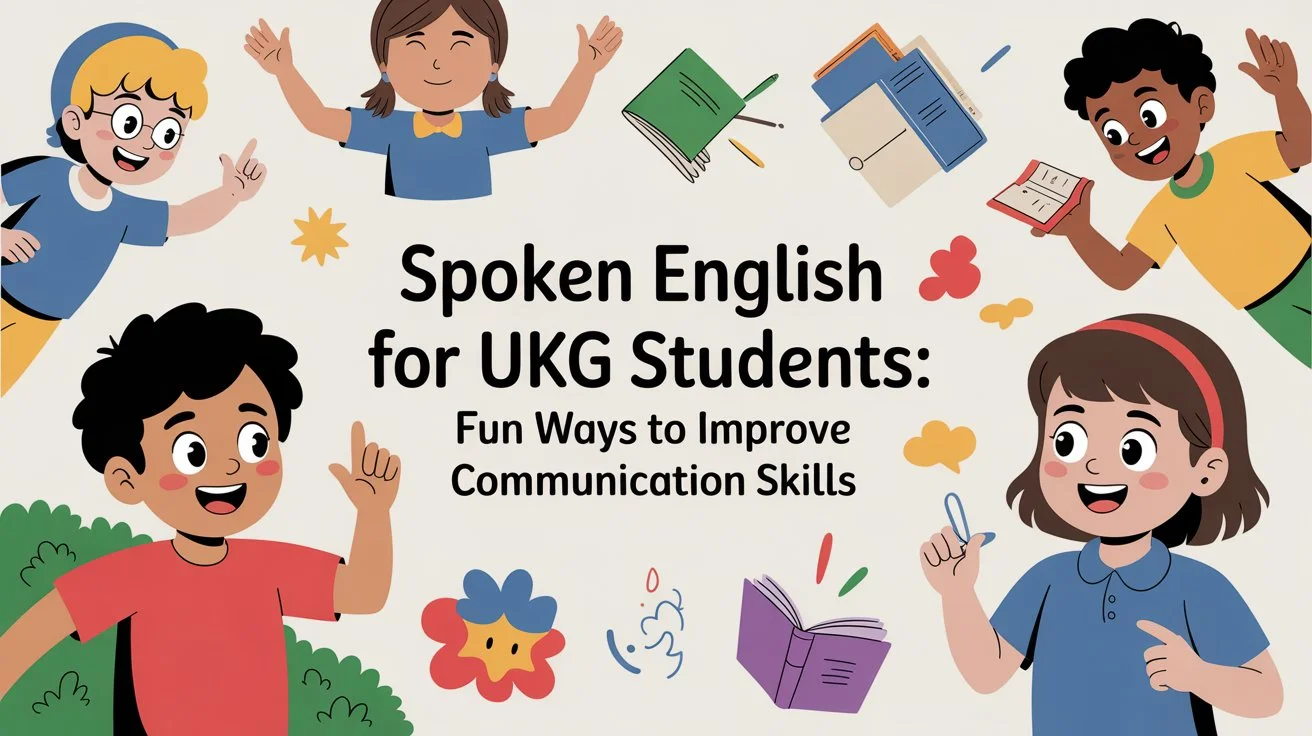Spoken English for UKG Students: Fun Ways to Improve Communication Skills




Helping UKG (Upper Kindergarten) students become comfortable with English is easier than you think, especially when learning is fun and interactive. At this age, children are naturally curious and love to explore new words, sounds, and phrases. With the right guidance, parents and teachers can nurture confident English speakers while laying the foundation for lifelong communication skills.
In this blog we will discuss about why spoken english matter for kids and how to teach english to kids in a fun way and more.
Introducing English at an early age is not just about learning a language; it’s about shaping confidence, communication, and learning readiness. Here’s why spoken English is important for UKG children:
Young children learn best when lessons are interactive and playful. Here are practical ways to make English learning enjoyable:
Teaching spoken English at this stage is all about patience, consistency, and encouragement. Here’s a simple approach:
To make speaking English a habit, encourage the “5 P’s”:
P | Meaning |
| Practice | Speak often, even if mistakes happen |
| Patience | Take time to learn new words and phrases |
| Positivity | Encourage and celebrate efforts |
| Participation | Join group activities, story sessions, and games |
| Politeness | Use kind and respectful words always |
Building daily habits helps UKG students integrate English into their lives naturally:
Habit Number | Good Habit | How to Practice |
| 1 | Greet others | Say “Good morning!” or “Hello!” daily |
| 2 | Say please & thank you | During meals and playtime |
| 3 | Speak in full sentences | Encourage “I like apples” instead of just “Apples” |
| 4 | Listen carefully | Let others finish before replying |
| 5 | Ask questions | Use “What is this?” or “Can you help me?” |
| 6 | Tell about their day | Share simple stories after school |
| 7 | Describe objects & actions | Name colors, shapes, and actions around them |
| 8 | Say sorry when needed | Practice polite responses |
| 9 | Try new words daily | Introduce one new word and repeat it in different sentences |
| 10 | Encourage others | Say positive things to friends and family |
Children learn English faster when immersed in a supportive environment:
Know more about Simple, Fun, and Effective Communicative English Classes, check out the blog given below,
Smart use of digital tools can reinforce spoken English:
Children learn best when mistakes are welcomed as opportunities:
With consistent practice, interactive methods, and a supportive environment, UKG students can develop strong English communication skills that will set them up for success in school and beyond. Early exposure to spoken English builds confidence, creativity, and curiosity making learning both fun and meaningful.
Give your child a joyful and confident start in English with Interval Learning. Our UKG spoken English classes combine interactive activities, playful learning, and personalized guidance to help every child shine.
Enroll in Interval Learning’s Online Spoken English Courses now and explore Interval's other Academic and Non-Academic courses!
The UKG stage (4–6 years) is the best time to start. At this age, children pick up new sounds and words quickly through play and daily interaction
Use simple phrases in daily routines, watch English cartoons, play language games, and gently praise their efforts to build confidence.
It builds confidence, improves communication, prepares them for school instructions, and strengthens memory, creativity, and problem-solving skills.
They will learn basic vocabulary, simple sentences, greetings, polite words, and communication skills through games, rhymes, and interactive activities
Yes. Online classes use digital tools like videos, interactive games, and story sessions that keep children engaged and motivated to speak.
Interval Learning combines expert teachers, playful activities, and personalized guidance to help UKG children speak English with confidence.
You can easily enroll by visiting our website, selecting the UKG Spoken English program, and registering online.